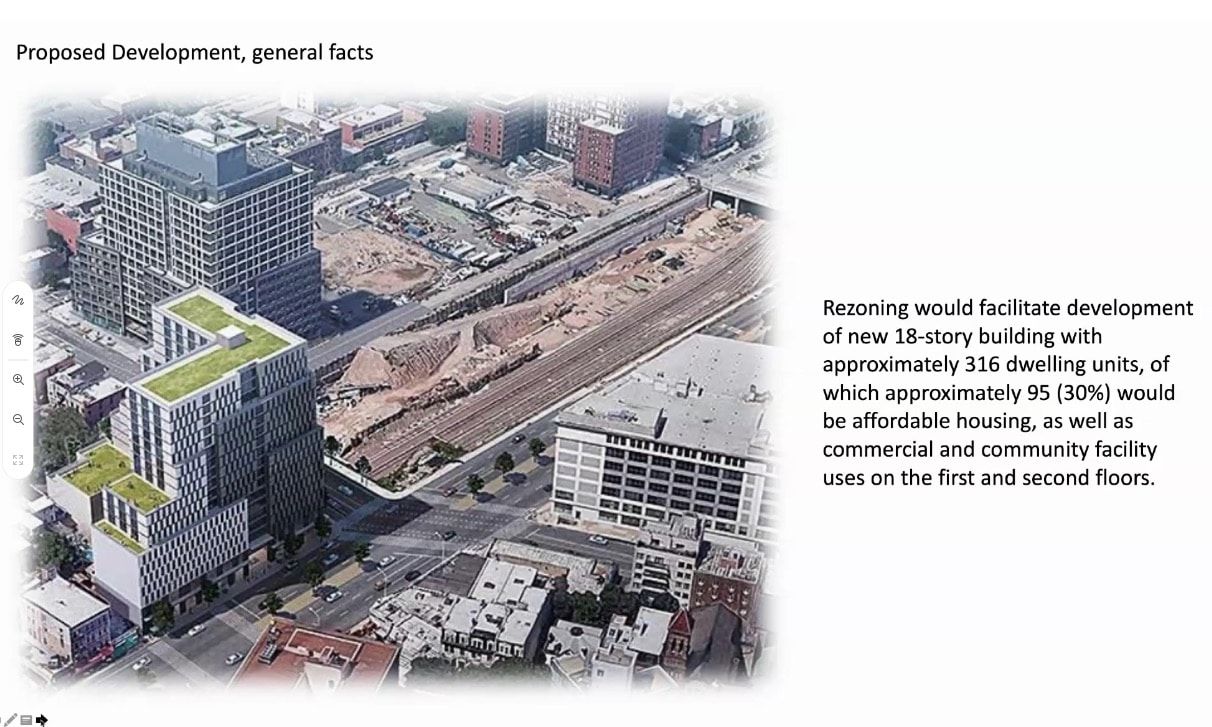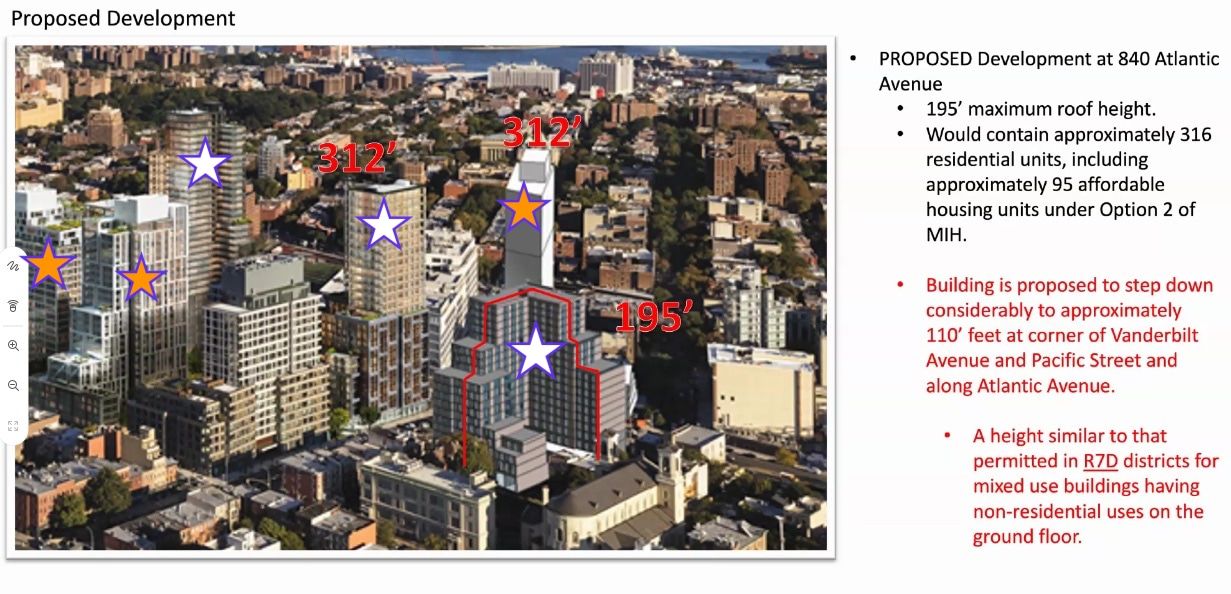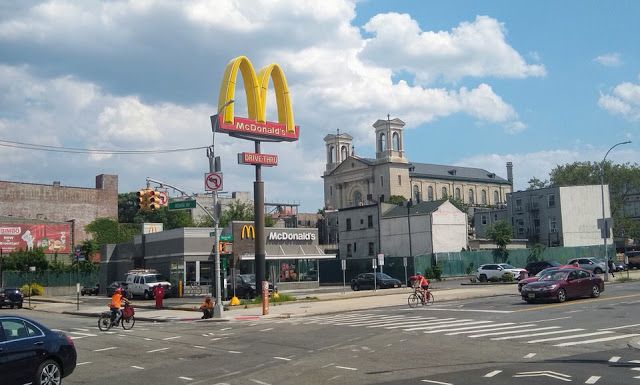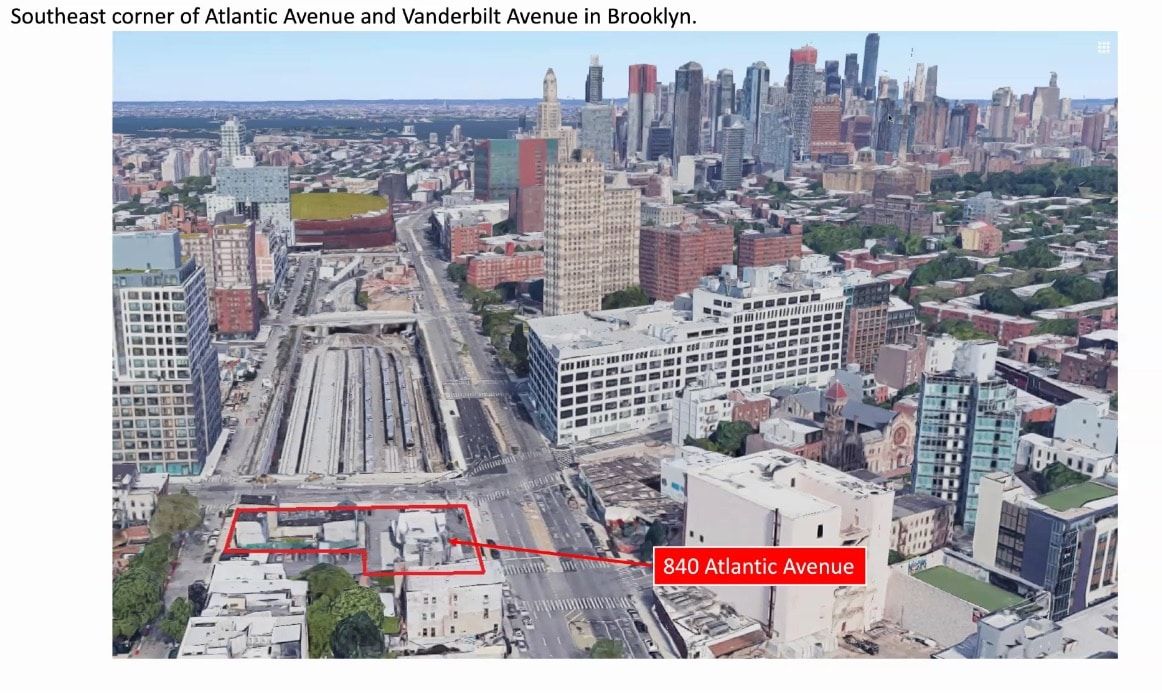Community Board 8 Wary Toward Proposed 18-Story Tower at McDonald’s Site in Prospect Heights


A stepped-up 18-story building, with 316 rental apartments and two floors of commercial space, might replace a large plot mainly occupied by a drive-through McDonald’s at the southeast corner of Vanderbilt and Atlantic avenues in Prospect Heights—if real estate developer Vanderbilt Atlantic Holdings gets city approval of its plans.
Not so fast, said members of Community Board 8’s Land Use Committee on Dec. 3, when the long-percolating 840 Atlantic Avenue project was presented at a virtual meeting, well before the city’s official land-use review might begin.
They argued that the developer sought even more bulk than they’d recommended for a neighborhood-wide rezoning known as M-CROWN that would manage the transformation of parcels currently limited to low-slung, manufacturing use. They said the private gain—that increased buildable square footage—exceeded the public benefit.
Surely something reasonably large will be built at that underutilized site, given the changing context near the east end of the Atlantic Yards (now Pacific Park) site, which ends at Vanderbilt Avenue. Two Pacific Park towers have been built along Dean Street between Carlton and Vanderbilt avenues, and two more, incorporating a below-ground Chelsea Piers fitness center and fieldhouse, are under construction. Atlantic Yards was enabled by a state override of zoning.

The proposed 840 Atlantic would be 195 feet and 340,000 square feet, similar in height and bulk to the catercorner 550 Vanderbilt Avenue, Pacific Park’s sole condo building, though the latter also offers adjacent green space and is part of a project with other promised public benefit.
The new tower would require rezoning of the property to allow development as it is currently zoned for manufacturing uses. It would be shorter but bulkier than another building under construction across the intersection to the north, 809 Atlantic Avenue, which has a wide, lower-slung base.
840 Atlantic Ave would face, across Vanderbilt, perhaps the last Pacific Park site to be built, known as B10, slated for a 313-foot tower (as tall as 809 Atlantic). The timetable for that remains uncertain, as it requires an expensive platform over the below-grade active railyard. Its construction would fulfill the project’s long-promised creation of open space, which involves the transformation of adjacent, demapped Pacific Street.

The Developer’s Case
The new building, contended the developer’s lawyer Benjamin Stark, reflected city priorities, allowing for a significant amount of new housing, including affordable units, and more bulk at that intersection, such as with 809 Atlantic.
Stark, representing Vanderbilt Atlantic Holdings, suggested the proposed building fits the neighborhood context by stepping down along Vanderbilt to the south and Atlantic to the east, to 110 feet. “We’ve got most of the bulk piled right on the corner,” he said.
Representatives said that 840 Atlantic’s planned 50,000 square feet of commercial space—nearly as large as the Whole Foods store in Gowanus—wouldn’t include big-box stores. The rezoning also would enable wider sidewalks and include 8,000 square feet for a community facility, such as for non-profit groups, or healthcare.
Board Pushback
Community Board 8’s response was wary. Board Member Gib Veconi invoked the board’s own proposed—but not yet embraced by city officials—M-CROWN plan to increase density on underutilized sites in the district now zoned for manufacturing, while also ensuring non-retail commercial space for jobs. (The 840 Atlantic presentation didn’t address that issue of job creation.)
“We haven’t heard any justification from a community benefit point of view” to endorse the increase, Veconi said, warning that approval would create “tremendous development pressure on the lots to the east,” obviating the M-CROWN framework.
He noted that Community Board 8 and elected officials had supported, along Atlantic Avenue, a Floor Area Ratio—the multiple of bulk to the underlying parcel—of 6 or 7 on those former manufacturing sites. Vanderbilt Atlantic Holdings seeks a Floor Area Ratio of 8.8.
In response, Stark suggested the site’s “unique position on the corner” justified the density increase of “perhaps one and a half FAR greater permitted density.” (An increase of 1.8 FAR translates to at least 25%.) Stark added that “our feedback with policymakers” indicated they didn’t see it as a precedent.
Board Chairperson Ethel Tyus observed that “people are sensitive now to the rapid pace of development… We will be looking for benefits and a moderation of proposals of this size.”
Board member Sarah Lazur noted that the M-CROWN rezoning aimed to create walk-to-work jobs, “and I didn’t see this addressed.”

Affordable Housing Negotiations
The building would include 30% affordable housing, as required under the city’s Mandatory Inclusionary Housing rule, with—as proposed—rents averaging at 80% Area Median Income (AMI). That would mean, in the 2020 context, studio apartments renting for an average of $1,250 a month, one-bedrooms at $1,570, and two-bedrooms at $1,878.
Lazur said that the Crown Heights Tenants Union, of which she’s a member, would not embrace that affordability plan. Veconi noted that Community Board 8 recommends an average set at 60% of AMI.
“In terms of AMI,” responded lawyer Stefanie Marazzi, “I think, ultimately, it is up to the Council Member.” Tom Li, a member of Vanderbilt Atlantic Holdings, said the developers were open to discussion on affordability. Vanderbilt Atlantic Holdings includes longtime site owner Tony Musto, as well as other investors, including major developer Rabsky Group.
The affordable units must be at least as large as the market-rate units, and no “poor door” is permitted.
Going Forward
Representatives of Vanderbilt Atlantic Holdings said they’re not ready to start the city’s Uniform Land Use Review Procedure—which requires advisory votes by the Community Board and Borough President, and approvals by the City Planning Commission and City Council—but would likely do so early next year. That process, known as ULURP, takes about seven months.
They plan to meet with the 35th District Council Member, Majority Leader Laurie Cumbo, whose preferences would be key, even as numerous candidates vie to succeed her, with some already criticizing her posture toward development projects. Tyus also encouraged them to meet with neighborhood groups like the North Prospect Heights Association and Prospect Heights Neighborhood Development Council.
Such projects often get presented in maximalist terms, leaving room for negotiated concessions. In this case, the Department of City Planning may favor a larger project than the Community Board’s framework.
Then again, Cumbo sent an Aug. 30, 2018 letter, also signed by CB 8’s then-Chairperson Nizjoni Granville and Borough President Eric Adams, endorsing the board’s “shared goals” for M-CROWN, implying a smaller building at the Vanderbilt/Atlantic intersection.
Meanwhile, while Vanderbilt Atlantic Holdings says it controls adjacent small lots east along Atlantic Avenue and south along Pacific Street, which would fill out the development site, it remains in federal court battling McDonald’s, which has sued to block what it called an improper rent increase designed to force it out.



